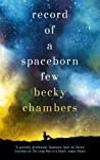
“Amias Mitchell,’ Kip said. ‘Born aboard the Asteria. Forty Solar days of age as of GC standard day 211/310. He is now, and always, a member of our Fleet. By our laws, he is assured shelter and passage here. If we have food, he will eat. If we have air, he will breathe. If we have fuel, he will fly. He is son to all grown, brother to all still growing. We will care for him, protect him, guide him. We welcome you, Amias, to the decks of the Asteria, and to the journey we take together.’ He spoke the final words now, and the room joined him. ‘From the ground, we stand. From our ships, we live. By the stars, we hope.”
It’s absolutely fascinating what Becky Chambers has done with The Wayfarers books. In one, we get a slice of life on a long haul spaceship with all sorts of aliens; in two), we get an embodied AI and a former cloned slave learning about being people, and now… we get the most ‘human’ centric of the stories thus far. It’s all about the Exodus Fleet–a few dozen generation ships built from the ruins of Earth’s cities and launched into deep space what feels like a very long time ago–certainly before humanity knew for sure there was anyone else out there.
As always, the worldbuilding is fascinating. The idea of the fleet still out there, even though the original reason (finding a new home) isn’t actually necessary any more feels so… human. And having multiple interacting plots–one young almost adult looking to leave the boring old fleet he’s always known and another journeying to the fleet to perhaps feel a connection to family long gone and in way over his head–is something Chambers does so well.
I think my only real negative of the story (and it’s such a small one) is that I loved how well Chambers does the exploration of how radically weird aliens are still people. By having an almost entirely human cast, we lose a lot of that. It doesn’t make it a worse story by any stretch of the imagination, but I found myself aching for something a little more… weird.
One more random bit of worldbuilding that I found fascinating was an exploration of found families. It’s something Chambers has done in all of the books, but this time around, the idea is that each family takes their name not from who they’re born to or who they marry, but rather the home they live in. In a society where these ancient ships and all the history is the core of society–it works. And it’s such a cool idea.
Anyways, well worth the read! Onward to #4!